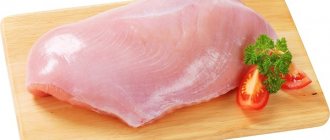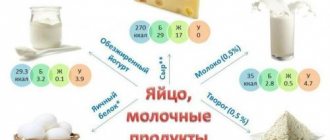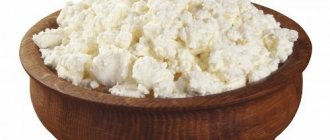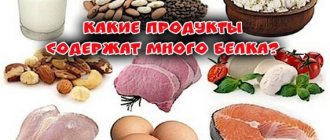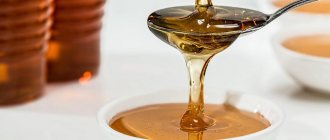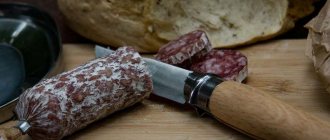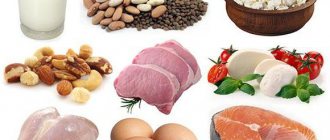What is useful about cottage cheese, what is contained in this product. How much protein does it contain - in fat and low-fat versions. Cottage cheese is a healthy, tasty and satisfying product that is in great demand in bodybuilding. Its features are a large amount of protein (protein) and the presence of a number of other useful elements in the composition. It is obtained by fermenting milk and then removing whey from the composition.
Depending on the manufacturing method, it varies in fat content:
- Bold. In this case, the fat percentage is 18%.
- Bold - 8-9%.
- Low-fat - up to 3%.
Many athletes confidently claim that cottage cheese is a protein. And they are indeed right. The product (per 100 g) contains 15-18 g of casein protein , characterized by a rich amino acid composition and excellent digestibility.
At the same time, it takes an average of 2-3 hours to break down the protein. For this reason, it is recommended to take cottage cheese at night, in the morning or 2-3 hours before training. Below we discuss in detail how much protein is in cottage cheese, what beneficial substances are present in it, and what are the features of a homemade product.
Protein content
There is a widespread belief that the fat content and type of cottage cheese do not matter and each type contains approximately the same amount of protein. It's a delusion. The volume of “building material” directly depends on the fat content. In addition, the amount of protein in cottage cheese is directly dependent on the method of production of the product - at home or in a dairy factory.
To figure out how much protein is in 100 grams of cottage cheese, you should seek help from special tables that clearly show the dependence of protein content on fat content level:
- 0% fat - 16.5 g;
- 0.1% fat - 16.7 g;
- 0.2%, 0.3% and 0.6% fat content - 18 g;
- 1% fat - 16.3 g;
- 1.8% fat - 18 g;
- 9% fat - 16.7 g;
- 11% fat - 16 g.
Eating cottage cheese immediately after the training process
Cottage cheese after a workout is very healthy; it contains a lot of protein and calcium, which are involved in the process of building muscles, restoring the body’s energy resource and maintaining the strength of tired muscle mass.

If we consider cottage cheese as the only supplier of protein, then you will need about 500 grams per day.
Depending on the training goal: gaining weight or cutting, you need to calculate the amount consumed in grams, so cottage cheese after a workout should be eaten by those who are in the process of gaining muscle mass.
The harm of cottage cheese to the body in this case is only due to individual intolerance to the product.
During drying
During the cutting period, bodybuilders do not try to gain muscle mass, so they consume low-fat cottage cheese or with a maximum fat content of at least 5%.
You can eat about 150-155 grams per day, dividing this amount into equal meals. Cottage cheese must be eaten in its pure form, without adding sugar, fruit or honey. It is not recommended to eat more than this gram per day.
For those who do not want to consume this particular fermented milk product, you can add eggs, poultry, fish and other seafood to your diet.
For weight gain
With increased muscle mass gain, fermented milk will become an important product in an athlete’s diet. It is important to consume only natural cottage cheese, and not curd mass, because only it contains a lot of protein, which will build new muscle mass.
If you eat unnatural products, then there will be no benefit from such curd at all.
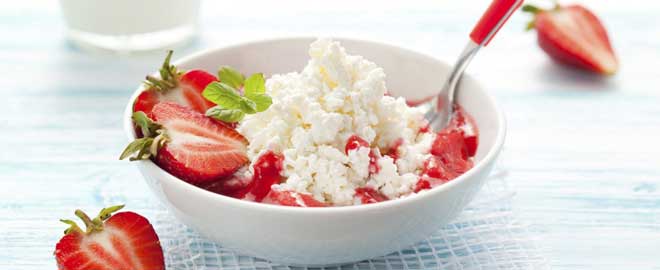
Cottage cheese is recognized as an ideal product for weight loss, as it contains a lot of protein and a small amount of carbohydrates.
Cottage cheese is the most suitable product for gaining weight, since catabolic processes are active during sleep, so you can eat cottage cheese for dinner without fear. Cottage cheese or casein in its composition slow down catabolism. For bodybuilders, there is cottage cheese for dinner and before bed - the optimal time of consumption for muscle growth due to the casein component. In addition, athletes often make a vitamin protein shake with curd and milk, adding a tablespoon of honey.
If you decide to lose weight
When following a strict diet, in order to lose weight, you need to consume only low-fat cottage cheese. This way, the number of calories will decrease due to a decrease in fat in the fermented milk and an increase in the protein component of the product. Cottage cheese before training for those losing weight is allowed in the amount of 150 grams.
How to consume this product for weight loss depends on the initial characteristics of the person and his preferences:
- Small portions and frequent meals a day.
- Eat cottage cheese 3 hours before training, a portion of cottage cheese after training - 2 hours later.
- It is better to eat cottage cheese for dinner when losing weight 2 hours before bedtime.
Homemade cottage cheese
As mentioned above, the difference between a store-bought and home-made product is significant. Experienced athletes know that homemade milk is healthier. This product usually contains 18 grams of protein (per 100 grams). In addition, the composition contains no less useful elements, including lysine and tryptophan. Casein, which is the basis of cottage cheese, is considered the main supplier of calcium, phosphorus and amino acids.
Just don’t overdo it and rely only on cottage cheese - everything should be in moderation. Thus, the daily protein intake, sufficient to cover the body’s needs, is 1-1.5 grams per kilogram of weight . For athletes, this figure increases to a level of 2-3 grams per kilo .
Experienced nutritionists recommend taking 200-300 grams of cottage cheese with one percent fat content per day. Plus - the minimum calorie content, which is at the level of 160 kcal.
Product usefulness
Cottage cheese can be used as a cosmetic product. Masks based on it will have a beneficial effect on the skin.
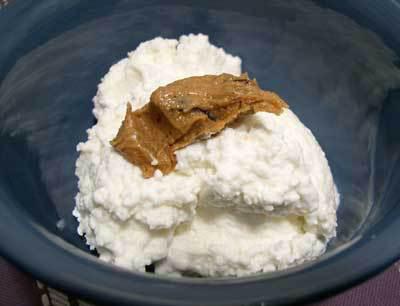
In addition to the above positive properties of this product, it should be said that cottage cheese improves the functioning of the human immune system. Regular use will protect the body from harmful substances, viruses and infections. Through cottage cheese, bacteria that are present in the gastrointestinal tract are normalized.
Calorie content
The amount of protein in the composition depends on the fat content of the cottage cheese, but not only this parameter is important. The lower the fat content, the lower the calorie content.
So, a five percent product contains 120 kcal per 100 grams . It is useful for people of any age. A fattier product (9%) guarantees the intake of 160 kcal . It is most suitable for preparing cheesecakes, casseroles, cottage cheese and other dishes. But for people who are on a diet, this option is not suitable.
If your goal is to lose a few kilograms, then you should give preference to cottage cheese with a minimum level of fat content (up to one percent). The advantage is a high percentage of protein in the composition and a minimal amount of fat. The total calorie content is 85 kcal , which will not harm the figure in any way.
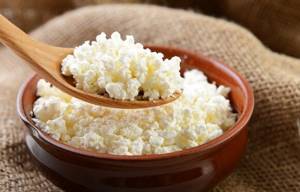
Food groups
All consumed foods can be divided into four main groups according to digestion time. Thus, you can determine how long the cottage cheese is digested. Below are the main digestive groups.
- The first includes foods that contain large amounts of carbohydrates. This group includes fruits, vegetables, juices and kefir. The entire digestion process will take about an hour or less.
- The second includes foods that contain large amounts of protein, namely: dried fruits, nuts, dairy products and greens. Their residence time in the intestines is two hours.
- The third digestion group includes foods that contain fat or fat and protein. This group includes various cereals, mushrooms, bread, cottage cheese, and cheese. Digestion time takes about three hours. More details about how much cottage cheese is digested in the stomach will be discussed below.
- The fourth group includes foods that take the longest to digest or are not digested at all. This includes fish, meat, canned food, tea and coffee.
Composition and benefits
When organizing your diet, you should know the following points:
- how many grams of protein are in cottage cheese;
- what vitamins are contained in it;
- what effect it has on the body.
We have dealt with the first question. It remains to study the composition and benefits of such a popular product.
So, cottage cheese contains not only protein, but also a lot of other elements:
- fats - 0-15 g;
- carbohydrates - 2 g;
- retinol - 0.08 mg;
- vitamin B1 - 0.04 mg;
- vitamin B2 - 0.35 mg;
- ascorbic acid - 0.5 mg;
- vitamin PP - 0.5 mg;
- iron - 0.4 mg;
- calcium - 165 mg;
- potassium - 113 mg;
- magnesium - 23 mg;
- phosphorus - 225 mg;
- sodium - 41 mg.
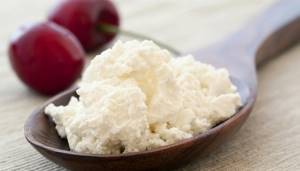
Thanks to this versatility, the product has a wide range of actions:
- Ensures normal functioning of the body.
- Strengthens bones and tooth structure.
- Normalizes the health of a pregnant woman and increases the likelihood of bearing a full-fledged child.
- Helps in the fight against excess weight.
- Participates in the construction of protein cells and muscle growth.
- Strengthens the immune system.
What if it's harmful?
It would seem that cottage cheese is a fairly safe and even healthy product. Is it protein or carbohydrates or fats? In any case, its use will not cause harm. However, sometimes problems arise.
In what cases does this happen? If the cottage cheese is of poor quality. If your body simply does not absorb it. If you don't digest any dairy products at all.
It turns out that you need to listen to the signals of your own body. Do you feel heaviness in your stomach? This is a sign of an unhealthy reaction to taking cottage cheese. Use this product in reasonable quantities.
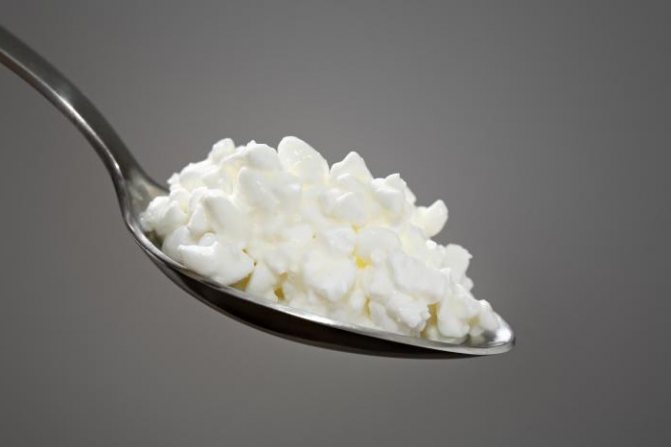
How to determine quality cottage cheese?
To get the maximum benefit from the product, it is important to consider a number of secrets that will help when choosing:
- Compound . The ideal option is when the composition contains only two ingredients - sourdough and cow's milk. But this rarely happens. Most often, enzymes, calcium chloride and other additives are added. Please note that the more auxiliary components, the lower the quality.
- GOST . Many people believe that TU and GOST are no different. This is wrong. If the product complies with GOST, then the manufacturer is responsible for ensuring that what is written on the packaging corresponds to reality.
- Price . Good cottage cheese should not cost less than a liter of milk. On average, the equivalent is as follows - 200 grams of cottage cheese = 0.5 liters of milk. In practice, the cost is even higher. If the price is too low, then there is a high risk of purchasing a fake.
- Best before date . A good product lasts no more than a week. If the shelf life is longer, then the composition contains a lot of preservatives that are unlikely to be beneficial to the body.
- Appearance . Excessive liquid or dryness indicates a violation of the technology. This option is not worth buying.
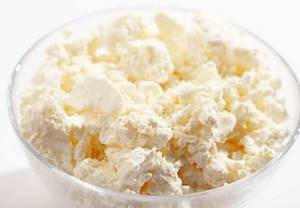
There is no need to check whether cottage cheese contains protein - this has already been proven. But it is necessary to establish the fact of the content of starch or vegetable fats. The following tests will help you:
- For vegetable fat content . To conduct the experiment, it is enough to leave the product for 24 hours at room temperature. If it has slightly soured and retained its color, then the quality is high. If a yellow coating appears and the smell changes, then this product is not natural.
- For starch content . The essence of the experiment is the contact of iodine with cottage cheese. If the mass has turned blue, then starch is present; if the color is still brown, then there is no starch.
In conclusion, it is worth highlighting a few recommendations in terms of preparing such a healthy dish. To obtain a better taste, cottage cheese can be mixed with the following products:
- sugar;
- banana;
- nuts;
- raisins;
- dried apricots.
To dissolve it is worth adding:
- low fat sour cream;
- juice;
- kefir;
- yogurt.
That's all. Knowing how many grams of protein are in cottage cheese per 100 grams and how to prepare the product, it will not be difficult to formulate a diet, improve health and achieve your goals in sports.
Results
And finally. Let's turn our attention to low-fat and homemade cottage cheese. Are they proteins or carbohydrates? Let's look at each product separately.
Low-fat cottage cheese contains half a gram of fat, twenty-three grams of protein, three grams of carbohydrates, three grams of saccharides, one and a half grams of ash, half a gram of saturated fat, two milligrams of cholesterol, a gram of organic acids, and seventy-one grams of water. An ideal option for those who love dietary nutrition.
Full-fat homemade cottage cheese contains eighteen grams of fat, seventeen grams of protein, three grams of carbohydrates, three grams of saccharides, a gram of ash, eleven grams of unsaturated fat, sixty milligrams of cholesterol, a gram of organic acids and sixty grams of water. Not a diet – but much tastier!
